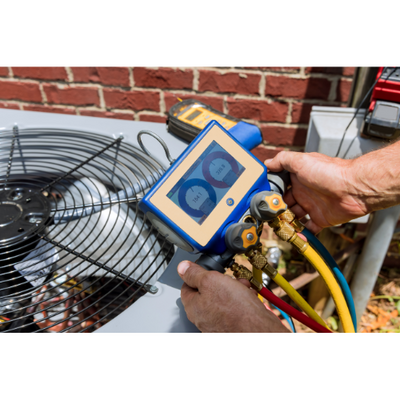- 1-905-452-8193
- Contact Us
- Member Login
- Get Listed Today
- 220,911 members

Central air conditioners play a crucial role in maintaining a comfortable indoor environment, especially during the hot summer months in Phoenix where our HVAC company Day & Night Air Conditioning, Heating & Plumbing is located. One essential component that enables these systems to cool effectively is the refrigerant, commonly known as Freon. It is helpful to understand how Freon works in your central air conditioner and the signs to watch for that signal your AC system might be experiencing low Freon levels. Symptoms of low freon in central air conditioner can mean a bigger problem that needs attention. Proper Freon levels are essential for maintaining optimal performance and extending the lifespan of your cooling system.
What Does Freon Do In Air Conditioning Systems?
Freon is actually the trade name for a group of chlorofluorocarbon (CFC) and hydrochlorofluorocarbon (HCFC) refrigerants. These chemicals work to facilitate the transfer of heat in your air conditioning system turning the hot air to cold. The air conditioning cycle begins with the compressor pressurizing the Freon gas, raising its temperature. The high-temperature, high-pressure gas flows through the condenser coils located outside the home, releasing the heat and transforming the gas into a high-pressure liquid.
Then the liquid Freon travels to the evaporator coils in your home’s air conditioning system. As warm air from your living space passes over these coils, the refrigerant absorbs the heat and turns into a low-pressure gas. The now cooled air is then circulated back into your home, creating a comfortable indoor temperature. This cycle repeats as long as the air conditioner is running.
Watch For These Symptoms of Low Freon in Your Central Air Conditioner
A central air conditioner requires a specific amount of Freon to handle the heat and cold exchange properly so that it can operate efficiently. If the Freon levels drop below the recommended amount, it can cause several issues that will negatively impact your AC system's performance. Here are some common signs of low freon in an AC unit:
Inadequate Cooling: Reduced cooling capacity is one of the most noticeable symptoms of low Freon levels. If your air conditioner is struggling to maintain a comfortable indoor temperature, it could be a sign that there is not enough refrigerant in your central air conditioner to absorb and release heat effectively.
Constant Cycling: An air conditioner with low Freon levels may cycle more frequently as it attempts to compensate for the reduced ability to cool down the hot air from a living space. This constant on-and-off cycling not only compromises the efficiency of your system but also puts additional strain on the AC system, increasing the changes of wear and tear and even a breakdown.
Ice Buildup on Coils: Low Freon levels can cause the evaporator coils in your air conditioner system to freeze. When your AC is low on freon the coils may become excessively cold, leading to the formation of ice. Ice buildup restricts airflow and reduces the system's ability to cool effectively.
Hissing or Bubbling Sounds: If you hear hissing or bubbling sounds coming from the air conditioner, it could mean you have a refrigerant leak. A Freon leak is one of the most common causes of low refrigerant levels and should be addressed promptly to prevent further damage.
Increased Energy Bills: A central air conditioner running with low Freon levels is less efficient, this leads to increased energy consumption. If you notice a sudden spike in your energy bills but you have not increased the cooling needs in your home, it could be a sign of low refrigerant levels.
What To Do If Your AC Has Low Freon Levels
Maintaining the proper level of Freon in your central air conditioner is essential for optimal performance and energy efficiency. Regular maintenance, including checking for refrigerant leaks and ensuring the correct refrigerant charge, can help prevent issues associated with low Freon levels. If your AC is exhibiting low freon symptoms however, it's crucial to consult with a professional HVAC technician near you to diagnose and address the problem promptly. Taking proactive measures to address low Freon levels in your AC unit will not only increase the longevity of your air conditioning system’s lifespan but also contribute to a more comfortable and energy-efficient home.
|
|
